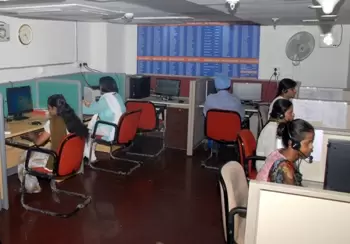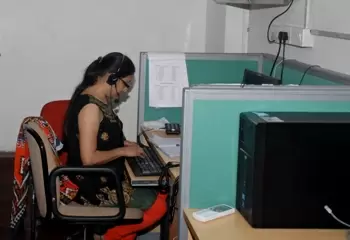Helpline is new to many Indians and more has to be done to encourage women to use it

05-July-2013
Vol 4 | Issue 27
Sonu Das was frantic. She had just stabbed someone. Recalls Suresh Grover, Director, The Monitoring Group (TMG), a leading anti-racist UK-based charity that promotes civil rights and runs a phone-in helpline for those under attack, “For us as a helpline service in the Das case, our emergency service role ended when the police arrived. But in the long term this woman needed support.”
Das had come to the UK as a domestic help and had been treated appallingly. She escaped her employers’ home with the help of a cab driver who locked her up, kept her passport and raped her.
 |
|
Volunteers taking calls on a helpline (Photos: Khadijah Faruqui)
|
After three days, she managed to leave the room, got hold of a kitchen knife and stabbed her assailant. She thought she had killed him when she had phoned TMG (he survived). Fortunately, TMG was able to get legal help and she was acquitted of manslaughter charges after six months.
Emphasises Grover, “This case illustrates some key aspects of a professionally run helpline. It has to be visible and its existence widely known. It has to be sensitive to the needs of the caller – it cannot pass value judgments and confidentiality is critical.
“It has to be credible, and credibility demands sustainability. In our experience, 40 per cent of callers are in urgent need of protection from harm.”
Grover’s words assume importance given the rising tide of sexual violence in India, which has prompted the setting up of more helpline services. Uttar Pradesh Chief Minister Akhilesh Yadav set up one in his state late last year.
In Delhi, when public anger spilled on to the streets after the December 16, 2012, gang rape of a student, Chief Minister Sheila Dikshit installed a dedicated helpline – 181 – for women facing sexual assault two weeks later. It presently functions from her office.
Making such efforts work, however, is another story. Recalls Khadijah Faruqui, a lawyer and activist, who is a consultant for the 181 service, “What struck me first was the fact that Delhi, despite its high levels of crimes against women, did not have a state-run intervention of this kind that understood women’s problems from a woman’s perspective.”
Faruqui, having worked with the helpline intervention of the women’s resource centre, Jagori, then began training the 181 helpline team and establishing a supporting network.
“Experience tells us that a woman under attack often has multiple issues – ranging from access to a hospital to education for a child. This meant that we had to connect with a whole spectrum of service providers – from hospitals to shelter homes.
“Because we had the backing of the chief minister, the response from these institutions was generally good,” says Faruqui. Today, the 181 helpline has a 17-member team, with four floor supervisors who are all graduates and have done case work for a minimum of eight years.
Apart from 181, and some helplines run by civil society organisations, women facing sexual harassment in Delhi can dial 100 and 1091 – numbers operated by the control room of the Delhi Police.
According to T.N. Mohan, Special Commissioner, Operations, Delhi Police, the role of these helplines have been “pivotal”.
Says Mohan, “We run the country's biggest response service of this kind. Of the hundred incoming lines of 'Dial 100', we have 10 dedicated to crimes against women and two more for stalking. This includes the ‘Dial 1091’ service.
“Before the Delhi gang rape of December, there were only two lines for such crimes. These helplines have gone a long way in shoring confidence in women. For instance, in January we had about 50 calls relating to domestic violence per fortnight, today it is around 1,000 per fortnight."
The Delhi-based Multiple Research Action Group (MARG) undertook a study of the 100 and 1091 helplines in late 2012, covering nine districts of Delhi, to understand better women’s experiences of police helplines and how they can be made more effective.
The study was part of the Safe City free From Violence against Women and Girls Initiative, supported by UN Women and anchored by Jagori in partnership with UN Habitat and the Department of Women and Child Development, Government of Delhi.
One of the major issues that emerged from the study was the need for better understanding. States Anju Talukdar, Executive Director, MARG, “The training we found was largely focused on technical aspects rather than on developing empathetic communication skills.
“There was also no system of monitoring. For instance, we found many women who were unhappy with the response they received, but there was no way that those who ran it could have learnt of this and corrected procedures. Monitoring and evaluation, even if done randomly, is important.”
The other aspect that was missing was the laying down of Standard Operating Procedures for all helpline operators.
Talukdar believes that a multiplicity of helplines is not helpful and that it would be far better if there was just one helpline that works and is seen to work. Kalpana Viswanath, Advisor, Jagori, agrees, “In the US, an effective helpline like 911 is a huge asset. Everyone knows it exists, and its very existence provides a sense of security to those who are isolated and vulnerable.”
 |
|
The significance of an effective helpline is widely recognised in India but it is still a work in progress
|
Akshara, an organisation working on gender justice issues in Mumbai, has been assisting the running of the police helpline, 103, for about five years now.
Nandita Shah, its co-director, elaborates, “Positioning a helpline is crucial. If we believe that it is fundamentally the state’s duty to protect women, then collaborating with the police assumes importance.”
While running helplines through centralised call centres may have emerged as the popular model, Shah believes they cannot guarantee the immediacy of response that a police helpline can. “Within a few minutes of a woman calling 103, a police patrol can be expected to arrive at her doorstep. This is an immense source of comfort, whether these women live in high-rises or slums,” she explains.
Akshara, therefore, concentrates on strengthening 103, by organising trainings and creating better data systems and directories of supporting agencies in a ward-wise and theme-wise manner.
The 103 helpline is now linked to protection officers, medical institutions, rescue homes, and other institutions. Akshara has also developed short films to be shown in movie theatres and about 4,000 Mumbai buses carry its helpline stickers.
It is also, however, true that many women are not comfortable about contacting the police. Shah agrees that this could be a problem and it means that the police will have to work harder at being more gender-friendly.
But she also points out instances where women actually wish the police come and talk to abusive families or husbands.
“They don’t want it to be a police case but welcome the police acting as a source of support. This preventive dimension is useful because it allows abused woman to work things out for themselves,” says Shah.
Today, the significance of an effective helpline is widely recognised in India but it is still a work in progress. Several aspects require a resolution. Should there be a multiplicity of helplines or should there be just one?
Is it better that the helpline is located within the police system, or outside it? What are the elements that make for effective follow-up action?
More clarity will emerge as the concept of helplines catches on and larger numbers of people are encouraged to use them. But this will only happen if there is trust.
Says Grover, “Normally, trust is built through face-to-face contact. Here we have to ensure trust through a telephone conversation that lasts a few minutes.
“That initial call is very important because it is for the first time that a person under assault has actually summoned the courage to talk. The manner in which it is handled will tell you whether the helpline service is working or not.” - Women's Feature Service














